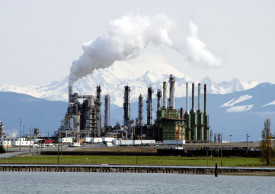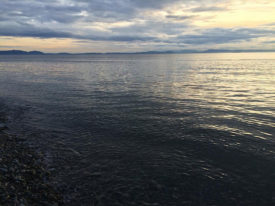 An inspiring story from Prince William Sound, the extreme north of Cascadia: A Seattle P-Icolumn described an effort by Stan Stephens, two-time president of a citizen watchdog group set up after the Exxon Valdez disaster, to enforce a pollution law long flouted by the oil industry.
An inspiring story from Prince William Sound, the extreme north of Cascadia: A Seattle P-Icolumn described an effort by Stan Stephens, two-time president of a citizen watchdog group set up after the Exxon Valdez disaster, to enforce a pollution law long flouted by the oil industry.
And he is doing it in his off hours: his day job is running a small business that depends on the beauty and natural abundance of the Sound, the northernmost of many rainforest fjords on our jagged coast.
Alaska’s politics are through-the-looking-glass peculiar: a state in the thrall of oil and the revenue it yields, and a state more dependent on the federal government than almost any other in the nation. (Indeed, among Northwest jurisdictions, there’s an inverse relationship between dependence on the federal treasury and belief in the virtues of the federal government.
Idaho and Alaska, rock ribbed in their ideological opposition to big government, get far more money from Washington, DC, than they pay in taxes. Oregon and Washington, with their liberal big cities and moderate statewide electorates, get far less, in terms of lucre, from American federalism.)
Alaska, which has fewer voters per US Senator than any state in the nation save Wyoming, is famous for its conservative voters and its gold-plated white elephants. Alaskan senator Ted Stevens rules the appropriations committee on one side of Capitol Hill; representative Don Young chairs the transportation committee (read: highway spending) on the other side. Between them, they’ve built a veritable cash pipeline from the Potomac to the 49th state. Seattle-based reporter Tim Egan writes today in the New York Times about the latest example: a monumental freeway bridge to connect Ketchikan to its tiny airport. Congressman Young is so proud of his pork-barrel successes that he recently crowed to the press: “I stuffed it [the transportation appropriations bill] like a turkey.”
In time, Alaska’s leadership will pass to a new generation. Let’s hope it’s more Stan, less Ted.








